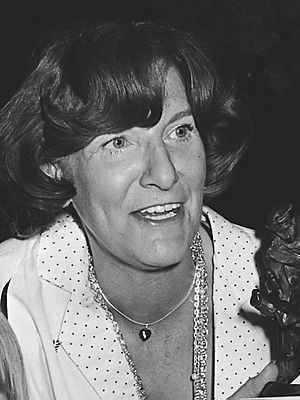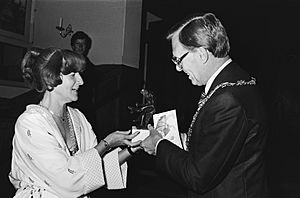Miep Diekmann facts for kids
Quick facts for kids
Miep Diekmann
|
|
|---|---|

Miep Diekmann in 1979
|
|
| Born | Maria Hendrika Jozina Diekmann 26 January 1925 Assen, Netherlands |
| Died | 9 July 2017 (aged 92) Scheveningen, Netherlands |
| Occupation | Writer |
| Nationality | Dutch |
| Genre | Children's literature |
Miep Diekmann (born January 26, 1925 – died July 9, 2017) was a famous Dutch writer. She wrote many wonderful books for children and young people. Her stories often took readers on exciting adventures.
Contents
Miep Diekmann's Early Life
Miep Diekmann was born in 1925 in a town called Assen in the Netherlands. Her father worked in the military. Because of his job, her family moved often.
They moved to Kampen in 1928 and then to Vreeland in 1930. In 1934, they moved to Willemstad, which is in Curaçao. She lived there until 1939.
Her Writing Career
Stories from the Dutch Caribbean
Miep Diekmann's time living in Curaçao was very important. It gave her many ideas for her children's books. Some of these books include De boten van Brakkeput (1956) and Padu is gek (1957). Another book inspired by her time there was De dagen van Olim (1971).
In 1956, she won the Kinderboek van het jaar award for De boten van Brakkeput. This story was even turned into a radio play in 1959.
Miep Diekmann also helped start a publishing company called Charuba in Aruba in 1984. She worked with Alice van Romondt and Liesbet ten Houten. From 1981 to 1988, she spent several months each year in Aruba. She coached and helped many Aruban writers.
Helping Writers in Czechoslovakia
During the 1960s and 1970s, Diekmann traveled to Czechoslovakia. She helped many Czech authors with their writing.
In 1981, she won the Boekensleutel award. She shared this award with Czech writer Dagmar Hilarová. They won it for their book Ik heb geen naam. In 1983, they also received the Janusz Korczak Literary Prize for the same book. This award came from a group called the International Board on Books for Young People.
Miep Diekmann was also in charge of the Dutch part of this group from 1979 to 1982. In 1994, she became an honorary member of PEN International in the Czech Republic. This was to thank her for her help with Czech literature.
Other Important Works and Awards
In 1964, Miep Diekmann won the Deutscher Jugendbuchpreis. This German award was for her book En de groeten van Elio (1961). This story also became a radio play in Germany.
She received the Staatsprijs voor kinder- en jeugdliteratuur award in 1970. She had actually helped create this award a few years earlier in 1964. In 1975, she won the Nienke van Hichtum-prijs for her book Dan ben je nergens meer.
In 1978, she wrote a children's poetry book called Wiele wiele stap. The pictures for this book were drawn by Thé Tjong-Khing. Diekmann won a Gouden Griffel award for the book. Thé Tjong-Khing won a Gouden Penseel award for his illustrations.
Her next poetry book, Stappe stappe step, also had pictures by Thé Tjong-Khing. It received a Vlag en Wimpel award in 1980. For all her great work in children's literature, she won the Laurens Janszoon Costerprijs in 1979.
In 1985, she won another Vlag en Wimpel award. This was for her book Hannes en Kaatje, 2 in een straatje. She won it again in 1986 for Hannes en Kaatje en het rommellaatje. Her books about Hannes and Kaatje are like modern versions of classic Dutch children's stories.
She also won a Vlag en Wimpel award in 1987 with her daughter-in-law, Marlieke van Wersch. This was for their book Hoe schilder hoe wilder. This novel helped explain the work of 17th-century painters.
Some of her books were translated into English. De boten van Brakkeput became The Haunted Island (1959). Gewoon een straatje was translated as Just a Street (1963). Marijn bij de lorredraaiers became Slave Doctor (1970). And Jossy wordt een Indiaan was translated as Indian Jossy (1970).
Miep Diekmann's Personal Life
Miep Diekmann was married to a journalist named Anton Kamphoff from 1948 to 1954. They had two sons together.
Her Passing
Miep Diekmann passed away on July 9, 2017.
Awards and Recognitions
- 1956: Kinderboek van het jaar (for De boten van Brakkeput)
- 1964: Deutscher Jugendliteraturpreis (for En de groeten van Elio)
- 1970: Staatsprijs voor kinder- en jeugdliteratuur
- 1975: Nienke van Hichtum-prijs (for Dan ben je nergens meer)
- 1978: Gouden Griffel (for Wiele wiele stap)
- 1979: Laurens Janszoon Costerprijs
- 1980: Vlag en Wimpel (for Stappe stappe step)
- 1981: Boekensleutel (for Ik heb geen naam)
- 1986: Vlag en Wimpel (for Hannes en Kaatje, 2 in een straatje)
- 1987: Vlag en Wimpel (for Hannes en Kaatje en het rommellaatje)
- 1987: Vlag en Wimpel (for Hoe schilder hoe wilder)
- 1991: Nominated for the Publieksprijs voor het Nederlandse Boek
 | Sharif Bey |
 | Hale Woodruff |
 | Richmond Barthé |
 | Purvis Young |


